- Home
- McBain, Ed
Bread (87th Precinct) Page 6
Bread (87th Precinct) Read online
Page 6
The top drawer of the dresser contained handkerchiefs, socks, ties, and a candy tin with a painted floral design. Hawes lifted off the cover. There were six sealed condoms in the tin, a photostated copy of Reardon’s birth certificate, his discharge papers from the United States Navy, and a passbook for a savings account at one of the city’s larger banks. Hawes opened the passbook.
“Can’t say I cared much for the company he was keeping these past few weeks,” Barbara said.
“What kind of company was that?” Hawes asked.
“Coloreds,” Barbara said.
The passbook showed that Frank Reardon had deposited $5,000 in his account on August 2, five days before the warehouse fire. His previous deposits, on July 15 and June 24, had been for $42.00 and $17.00 respectively. The balance, before the $5,000 deposit, had been $376.44. Hawes put the passbook into his jacket pocket.
“I got nothing against coloreds,” Barbara said, “so long as they stay uptown. He had these two big coloreds coming here, and last week he had this bitch come in stinking of perfume. Couldn’t get her smell out of the hallway for a week. You should’ve seen her. Hair out to here, earrings down to here, skirt way up to here.” Barbara pulled her smock higher in illustration. “Spent a couple of nights with him, used to wait for him outside the building till he got home from work.”
“When was this?” Hawes asked.
“Last week sometime.”
“Would you remember when last week?”
“Monday and Tuesday, I think. Yeah, both nights.”
“Do you know her name?”
“Frank didn’t introduce me,” Barbara said. “I’d have told her to get her black ass uptown, where she belongs.”
“And you say some black men were here, too?”
“Yeah. But not at the same time, you understand.”
“When were they here?”
“The last week in July sometime.”
“How many times were they here?”
“Two or three times.”
“How many men did you say?”
“Two of them. Black as the ace of spades. I ran into one of them once, he scared hell out of me.”
“How do you mean?”
“I mean the look of him. Big as a house, and wearing these clothes the coloreds think are so sharp, you know, and with a knife scar running clear down the left-hand side of his face. Drove up in a big white Caddy. I told my husband about him, and he said I’d better stay in the apartment whenever people like that were around. You know those coloreds, nothing they’d like better than to get their hands on a white woman. Especially a blonde,” Barbara said. “Not that my husband’s ever around to stop anybody from doing anything they wanted to do. He’s always running downtown to Bridge Street, picking up hardware and electrical stuff on those sidewalk stalls they got down there. I could get raped here by half a dozen coloreds, he’d never know the difference.”
“Would you know the names of those two men?” Hawes asked.
“Nope. I’m not interested in knowing those kind of people, thank you. It’s awfully hot in here, don’t you think?”
“Supposed to hit ninety-four,” Hawes said, and opened the second dresser drawer.
“Thank God I’ve got air conditioning downstairs,” Barbara said. “Only in the bedroom, but that’s at least something.”
There were half a dozen shirts, a cardigan sweater, three pairs of undershorts, and two T-shirts in the second drawer. A white plastic battery-powered vibrator in the shape of a penis was tucked under the cardigan sweater. Hawes closed the drawer.
“What I’m going to do, soon as we finish here,” Barbara said, “is go downstairs, pour myself a beer, and go hide in the bedroom, where the air conditioner is.”
Hawes opened the bottom drawer of the dresser. It was empty. He closed the drawer and walked to the night table on the left-hand side of the bed.
“I can’t see you anymore,” Barbara said from the living room, “and I like to watch you work.” She suddenly appeared in the doorframe, arms folded across her midsection, cradling her breasts. “That’s better,” she said. She watched as Hawes opened the single drawer in the night table. There was a flashlight in the drawer, a half-empty carton of Camels, a box of wooden kitchen matches, and an address book.
“That husband of mine,” Barbara said, and hesitated.
Hawes opened the address book and quickly scanned it. Frank Reardon had not known too many people. There were perhaps a dozen listings in all, scattered alphabetically throughout the book. One of those was for a man who lived in Diamondback, uptown. His name was Charles Harrod, and his address was 1512 Kruger Street. The listing was significant only in that Diamondback was the city’s largest black ghetto.
“Probably be gone all day,” Barbara said. “My husband. Probably won’t get home till suppertime.”
Hawes put the address book in his pocket with the passbook and walked back through the living room and into the kitchen. Stove, refrigerator, wooden table, cupboard over the sink. He glanced through the cupboard quickly.
“Hot as hell in here,” Barbara said. “I’d open the windows, but I don’t know if I’m allowed to. I mean, with Frank being dead and all.”
“I’m almost finished here,” Hawes said.
“I don’t envy you men in the summertime,” Barbara said, “having to wear suits and ties. I’ve got nothing at all on under this little thing, and I’m still suffocating.”
Hawes closed the cupboard doors, took a cursory look through the drawer in the kitchen table, and then turned to Barbara, who was standing near the refrigerator, watching him. “Well, that’s it,” he said. “Thank you very much.”
“My pleasure,” she said, and walked silently out of the apartment. She waited for him to join her in the hallway, locked the door to Reardon’s apartment, and then started down the steps ahead of Hawes. “Nice cold bottle of beer’ll really hit the spot now,” she said. She glanced over her shoulder, one hand on the banister, and said, almost shyly, “You feel like joining me?” “I’ve got to get uptown,” Hawes said. “Thanks, anyway.” “Nice and cool in my bedroom,” Barbara said. “I got a nice air conditioner in there. Come on,” she said, and smiled. “Give yourself a break. Little beer never hurt anybody.” “Gee, I’d like to,” he said, “but I’ve got a lot of work to do.” “Well, okay,” she said, and went swiftly down the stairs. On the sidewalk outside, she said, “Anything else you need, you know where to find me.” “Thanks again,” Hawes said.
She seemed about to say something more. Instead, she nodded briefly, and went into the alley to her apartment, and her air-conditioned bedroom, and her bottle of beer.
The Police Department had advised all residents of the city that special spray attachments for fire hydrants were available at all precinct houses, and that any civic group could obtain them there free of charge, merely by applying. The idea behind this generous distribution of spray attachments was a good one. During the summertime people in the city’s slums opened the hydrants full force in order to provide showers for their sweltering kids. This was good for the kids but bad for the firemen. The open hydrants, you see, drastically reduced the water pressure needed for firefighting. Since the spray attachments needed very little water in order to operate effectively, they seemed like a logical and fair compromise.
But what excitement was there in legally obtaining one of those attachments from the fuzz, when it was just as simple to screw off the nozzle caps with a monkey wrench, open the octagonal brass valve on top of the hydrant, and then tilt the end of a wooden orange crate against the high-pressure stream of water that roared from the open spout, providing a city waterfall of spectacular proportions? If, as a result, a tenement down the street happened to burn down because the firemen didn’t have enough water pressure when they attached their hoses—well, that was one of the prices a slum dweller had to pay for his summertime fun and games. Besides, most slum fires occurred in the dead of winter, caused by cheap, faulty heaters and
bad electrical wiring.
The hydrants all up and down Kruger Street were on as Hawes made his way up the block. Black boys and girls in bathing suits splashed in and out of the icy cold cascades, while grownups sat on front stoops and fire escapes, fanning themselves and watching in envy. It was only a quarter to eleven in the morning, but the temperature had already soared to ninety-one degrees, and the air was stifling. 1512 Kruger was a red-brick tenement with a Baptist storefront church on one side of it and a billiard parlor on the other. Three young men wearing blue denim gang jackets were standing outside the green-painted, plate-glass window of the pool hall, watching the younger kids frolicking in the water at the nearest open johnny pump. They glanced at Hawes as he climbed the three steps to the front stoop of the building. A fat black man in a white undershirt sat against the iron railing, fanning himself with a copy of Ebony, holding a bottle of Coca-Cola in which there were two twisted straws. The street gang members knew that Hawes was a cop. So did the fat man in the white undershirt. This was a slum.
Hawes went into the vestibule and checked the mailboxes. There were twelve boxes in the row. Eight had broken locks. Only one of them had a name in the space provided, and the name was not Charles Harrod’s. Hawes came out onto the stoop again. The street gang members had disappeared. The fat man was watching the kids playing under the water.
“Good morning,” Hawes said.
“Morning,” the man replied briefly. He put both straws between his lips, sipped from the bottle, and kept looking at the kids.
“I’m looking for a man named Charles Harrod…”
“Don’t know him,” the man said.
“He’s supposed to live in this building…”
“Don’t know him,” the man repeated. He had not taken his eyes from the children playing near the fire hydrant.
“I was wondering if you knew what apartment he lived in.”
The man turned and looked up at Hawes. “I just told you I don’t know him,” he said.
“Know where I can find the super of the building?”
“Nope,” the fat man said.
“Thanks a lot,” Hawes said, and walked down the flat steps to the pavement. He wiped the back of his hand across his sweating upper lip, and then went into the pool hall. There were two tables in the place, one of them empty, one of them occupied by the gang members he had seen standing outside a few minutes ago. Hawes walked over to the table. “I’m looking for a man named Charles Harrod,” he said. “Any of you fellows know him?”
A young man, leaning over the table, stick in hand, said, “Never heard of him,” and triggered off a shot that sank two balls and left the cue ball in position for an easy chip shot. He was tall and thin, sporting a black beard and mustache, the back of his denim jacket ornately painted with the name of the gang—The Ancient Skulls—curving over an appropriate painting of a grinning white skull and crossbones. Hawes thought he had seen the last of the street gangs twenty years ago, but he supposed all good things—like plagues and locusts—returned at regularly spaced intervals.
“He’s supposed to live in the building next door,” Hawes said.
“We don’t live in the building next door,” another of the young men said. He was bigger than the bearded one, almost as big as Hawes, the pool cue looking undersized in his enormous hands.
“Where do you live?” Hawes asked.
“Who wants to know?”
“I’m a police officer, let’s cut the crap,” Hawes said.
“We’re shooting a friendly game of pool here,” the bearded one said, “and we don’t know Charlie whatever-his-name-is…”
“Harrod.”
“We don’t know him. So, like, what’s the beef, Officer?”
“None at all,” Hawes said. “What’s your name?”
“Avery Evans.”
“And you?” Hawes said, turning to the big one.
“Jamie Holder.”
“And none of you know Harrod, huh?”
“None of us,” Holder said.
“Okay,” Hawes said, and walked out.
The fat man was still sitting on the stoop. His Coke bottle was empty and he had placed it between his shoes. Hawes climbed onto the stoop and went into the vestibule. He opened the broken glass door dividing the vestibule from the inner hallway, and then started up the flight of steps to the first floor. The hallway stank of urine and cooking smells. He rapped at the first door he came to, and a woman inside said, “Who is it?”
“Police officer,” he said. “Want to open up, please?”
The door opened a crack. A woman with her hair tied in rags peered into the hallway. “What is it?” she said. “Nothing’s happened to Fred, has it?”
“Nothing’s happened to anybody,” Hawes said. “I’m looking for a man named Charles Harrod…”
“I don’t know him,” the woman said, and closed the door.
Hawes stood in the hallway a moment longer, debating whether he should go through this routine with every apartment in the building, and finally decided to go find a cop. He found one up the block, near the corner, a black patrolman turning off the fire hydrant there with a monkey wrench. Kids in swimming trunks danced around him as the patrolman worked, sweating in his blue uniform, armpits stained. They shouted at him, and taunted him, and splashed their feet in the curbside puddles, hoping to get him as wet as they were, but he steadfastly turned the octagonal brass fitting until the stream of water became a trickle and then stopped entirely. He screwed both heavy iron caps back onto the hydrant, and then fitted a new lock into place, a lock that would be broken before the day was out, just as its predecessor had been broken.
“You want to use the hydrants, go get a spray attachment,” he said to the assembled kids.
“Go hump your mother,” one of the kids said.
“I already humped yours,” the patrolman answered, and began walking up the block toward the next hydrant.
Hawes fell into step beside him. “Got a minute?” he said, and flashed his detective’s shield.
“What’s up?” the patrolman asked.
“I’m looking for a man named Charles Harrod, 1512 Kruger. Would you know what apartment he’s in?”
“Harrod, Harrod,” the patrolman said. “Big guy, white Cadillac, tailor-made suits, knife scar down the left side of his face. That the one?”
“Sounds like him.”
“Building near the pool parlor,” the patrolman said. “Is that 1512?”
“That’s 1512.”
“He lives on the top floor, I don’t know the apartment number. There’s only two apartments on each floor, so you can’t go wrong.”
“Thanks, pal,” Hawes said.
“Don’t mention it,” the patrolman said, and walked off carrying his monkey wrench. Up the block, the kids had already seen him coming and were already starting to chant.
Hawes went back to the building. Inside the church next door, the congregation had begun singing. The fat man on the stoop was tapping his foot in time to the music. He knocked over the Coke bottle and bent to pick it up as Hawes went past him again and into the dark vestibule. The heat on the upper stories of the building was stifling. Hawes reached the sixth floor and knocked on the door nearest to the stairwell. There was no answer. He knocked again, and this time a voice said, “Who’s there?” The voice was pitched very low; he could not tell if it belonged to a man or a woman.
“Charlie?” he said.
“Charlie ain’t here right now,” the voice said. “Who’s that, anyway?”
“Police officer,” Hawes said. “Mind opening the door?”
“Go away,” the voice said.
“I’ve got a warrant for the arrest of Charles Harrod,” Hawes lied. “Open the door, or I’ll kick it in.”
“Just a minute,” the voice said.
Hawes moved against the wall to the side of the door—just in case the voice inside was Charlie Harrod’s, and just in case Harrod had shot Frank Reardon to death, and
just in case his lie about the warrant resulted in a fusillade of bullets through the wooden door. He unbuttoned his jacket and cleared his holster. Footsteps were approaching the door. The door opened wide.
A young black girl was standing in the doorway, backlighted with strong sunlight that blazed through an open kitchen window. She was wearing dungarees and a pink halter top. She was tall and slender, with long narrow fingers and an Afro hairdo that billowed from her head like a cloud of smoke. Her eyes were brown and savvy and distrustful and angry. In her low, hoarse voice, she immediately asked, “Where’s the warrant?”
“I haven’t got one,” Hawes said. “Does Charles Harrod…?”
“Goodbye,” the girl said, and started to close the door.
Hawes stuck his foot into it. “Don’t make me go all the way downtown for one, honey,” he said. “I get mean as hell when I have to go to all that trouble.”
The girl, holding the door against his foot with all her strength, said, “I told you Charlie ain’t here. I don’t know where he’s at.”
“Let’s talk about it,” Hawes said.
“Nothing to talk about.”
“Back away from that door before I knock you on your ass,” Hawes said.
“I know my rights.”
“You can tell me all about them at the station house, when I claim you tried to slash my face with a razor blade.”
“What razor blade? Man, that’s pure shit, and you know it.”
“The razor blade I keep right here in my jacket pocket, just for situations like this one. You want to open that door, or do I kick it in and bring assault charges?”
“Man, you’re really something,” the girl said, and opened the door wide. “Okay,” she said, “let’s see it.”
“The razor blade?”
“The badge, man, the badge.”
Hawes opened his wallet. She studied his shield and his ID card, and then turned her back, walked into the apartment, and went directly to the sink, where she opened the faucet and let the water run. Hawes followed her inside, closing and locking the door behind him. The kitchen was small and badly in need of a paint job, but bright with sunshine that streamed through the open window. A cheesebox with geraniums in it sat on the fire escape outside. The refrigerator had been painted a pastel blue, and was in one corner of the room alongside an ancient gas stove. The sink and hanging cabinets were on the wall obliquely opposite the window. A wooden table and two chairs were against the other wall. A telephone rested on top of an Isola directory on the table.

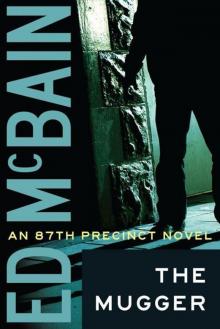 87th Precinct 02 - The Mugger
87th Precinct 02 - The Mugger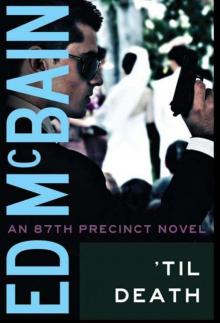 87th Precinct 09 - Til Death
87th Precinct 09 - Til Death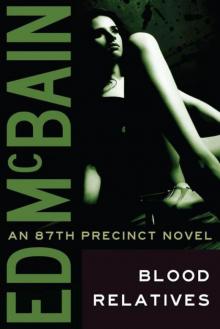 Blood Relatives (87th Precinct)
Blood Relatives (87th Precinct) Killer's Payoff
Killer's Payoff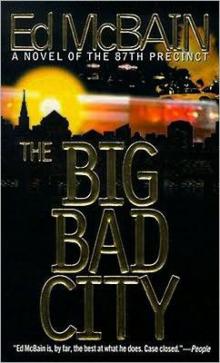 The Big Bad City
The Big Bad City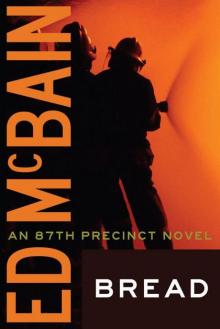 Bread (87th Precinct)
Bread (87th Precinct)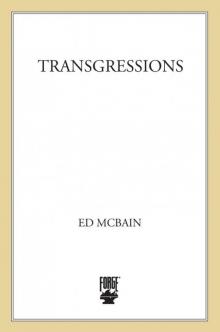 Transgressions Vol. 3
Transgressions Vol. 3 Runaway
Runaway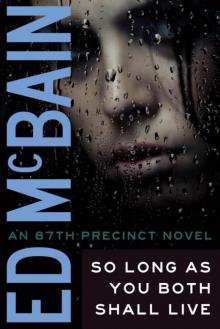 So Long As You Both Shall Live (87th Precinct)
So Long As You Both Shall Live (87th Precinct)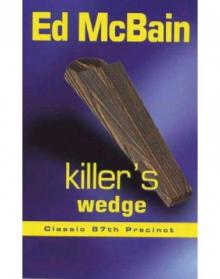 Killer's Wedge
Killer's Wedge